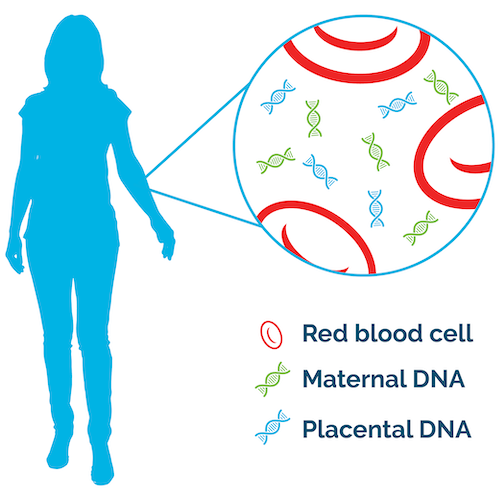The NxGen MDx Informed Non-Invasive Prenatal Screen
Trusted insight into your baby’s health. Learn about your baby’s risk of a chromosomal condition like Down Syndrome.
What is the NxGen MDx Informed Prenatal Screen?
It is a non-invasive prenatal screen (NIPS) that analyzes small amounts of DNA from your baby’s placenta known as cell-free DNA which are present in your blood. This screen detects if your baby has either too many or too few chromosomes (known as an aneuploidy) that could lead to a health issue. NIPS is considered to be appropriate for all pregnant women with a singleton or twin pregnancy regardless of age or personal history.

Placental DNA From Your Baby
Is Present In Your Blood
Why Should I Get This Screen?
NIPS can give you valuable insights into the genetic health of your baby as early as 10 weeks into your pregnancy. NIPS is very accurate, reduces the need for invasive diagnostic procedures, and poses no risk to your baby.
Whether you receive a low- or high-risk result, you and your healthcare provider can use it to help make educated decisions about your baby’s risk, management of your pregnancy, and delivery options.
Understanding Your Risk
Low-Risk
No Aneuploidy Detected
What if I get a Low-Risk Result?
Your pregnancy has a low risk of having the aneuploidies that the Informed Prenatal Screen looks for. Most pregnancies have a low-risk result.
High-Risk
Aneuploidy Detected
What if I get a High-Risk Result?
Your pregnancy has an increased risk for one or more of the aneuploidies that the Informed Prenatal Screen looks for. Your healthcare provider may discuss genetic counseling, diagnostic testing, and/or adjustments in managing your pregnancy.
What Does it Screen for?
- Trisomy 21 (Down Syndrome)
- Trisomy 18 (Edwards Syndrome)
- Trisomy 13 (Patau Syndrome)
- Sex Chromosome Aneuploidies
The Informed Prenatal Screen can also tell you your baby’s sex if desired, including twin pregnancies.*
Your doctor may recommend additional screening such as microdeletions (small chromosomal changes) or expanded aneuploidies (all chromosome analysis) if they believe it is necessary.
Talk to a Genetic Counselor
As a NxGen MDx client, you’ll have access to personal genetic counselors who can help explain the results of you screens and provide insight on how to move forward. To schedule a personal conference to discuss your screen results, call (855) 776-9436 or click the link below.
Access for All
We want prenatal testing to be affordable for everyone. If you are uninsured or think you will have difficulty paying for the Informed Prenatal Screen, our Access for All Program may be able to help.
How has the NxGen MDx NIPS helped other patients?
The genetic counselor I had was very knowledgeable and eased my mind on all potential questions! Was courteous and professional and made sure no stone was left unturned with potential risks. Very happy I got the tests!
Casey, our genetic counselor, was very communicative, personable, and knowledgeable. She explained our test results in a clear and easy-to-understand way while addressing our concerns so that our minds could be at ease. Many thanks and we highly recommend.
In addition to providing all the facts and information I was curious about, the genetic counselor created a comfortable space for conversation about the more personal aspects of my motivations and implications for the results from the screening.
My genetic counselor spoke with me for an hour regarding my genetic test results. Her approach as well as her depth of knowledge were very impressive and helped me understand the implications of the results. She went above and beyond answering my questions for family planning purposes.
Staff was knowledgeable and were able to explain things in laymen’s terms so I could understand the results. Stacy was patient and thoughtful; I will definitely recommend NxGen MDx to everyone.
Interested in the NxGen MDx Informed Prenatal Screen?
Sources
*Presence/absence of chrY is detected at >99.9% accuracy. Fetal sex discrimination between, Male/Male, Male/Female, and Female/Female has an overall accuracy of 91%. -NxGen MDx Internal Data 2022.
Accurate Screening for All Pregnancies
- NIPS can be used in singleton and twin pregnancies
- High sensitivity and specificity regardless of age, ethnicity, or BMI
- No restrictions for ART pregnancies, egg donors, surrogates, or bone marrow/organ transplant recipients
- Low “no-call” (assay failure) rate (0.3%) means fewer unnecessary diagnostic procedures
%
No-Call Rate
Common Trisomies & Sex Chromosomes (Standard)
The Informed Prenatal Screen looks at these conditions
- Trisomy 21 (Down Syndrome)
- Trisomy 18 (Edwards Syndrome)
- Trisomy 13 (Patau Syndrome)
- Fetal sex (including individual fetal sex calling for twin pregnancies*)
- Monosomy X (Turner Syndrome)
- Trisomy X (Triple X Syndrome)
- XXY Syndrome (Klinefelter Syndrome)
- XYY Syndrome (Jacob’s Syndrome)
Further Screening Options (Upon Request)
Expanded Aneuploidy Analysis
Expanded aneuploidy analysis may offer insight into pregnancies with fetal growth restriction or unexplained ultrasound abnormalities.
Microdeletions
- 22q11.2 (DiGeorge Syndrome)
- 15q11.2 (Angelman/Prader-Willi Syndrome)
- 1p36 Deletion Syndrome
- 4p (Wolf-Hirschhorn Syndrome)
- 5p (Cri-du-chat Syndrome)
Superior Platform, Superior Screen
Prenatal Screening with WGS (whole genome sequencing) has a significantly lower no-call rate than prenatal screening using a single nucleotide polymorphism (SNP) based methodology. Having a low no-call rate reduces the number of invasive procedures that are needed and decreases your patients’ anxiety.
Features of WGS vs. SNP Methodology
| Features | SNP | WGS |
|---|---|---|
| Common Chromosomal Aneuploidies | ✓ | ✓ |
| Sex Chromosome Aneuploidies | ✓ | ✓ |
| Fetal Sex | ✓ | ✓ |
| Microdeletions | ✓ | ✓ |
| Expanded Aneuploidy (23 Chromosomes) Analysis | ✓ | |
| No Limitations Based on BMI | ✓ | |
| Most Widely Validated by Leading Medical Institutions | ✓ | |
| Fewer Unnecessary Invasive Procedures | ✓ |


Actionable Results for All Your Patients
We use a whole genome sequencing (WGS) platform because we believe that all patients deserve an NIPS result that they can rely on.


Individual Fetal Sex Determination for Twins*
NxGen MDx can determine the sex of both fetuses in the case of a twin pregnancy.*
%
High 22q11.2 Positive Predictive Value
NxGen MDx Informed Prenatal Screen’s positive predictive value (PPV) is 90.0% for 22q11.2 deletion syndrome.
Connect Your Patients with a Certified Genetic Counselor
When you work with us, you and your patients will have access to a team of board-certified genetic counselors. Our counselors are available to discuss the results of screens and what they mean. Patients can discuss their results by scheduling an appointment with one of our counselors.
Connect With Us
If you are interested in offering the NxGen MDx Non-invasive Prenatal Screen or want to learn more, click the button below to contact a NxGen MDx representative.
Sources
*Presence/absence of chrY is detected at >99.9% accuracy. Fetal sex discrimination between, Male/Male, Male/Female, and Female/Female has an overall accuracy of 91%. -NxGen MDx Internal Data 2022.





